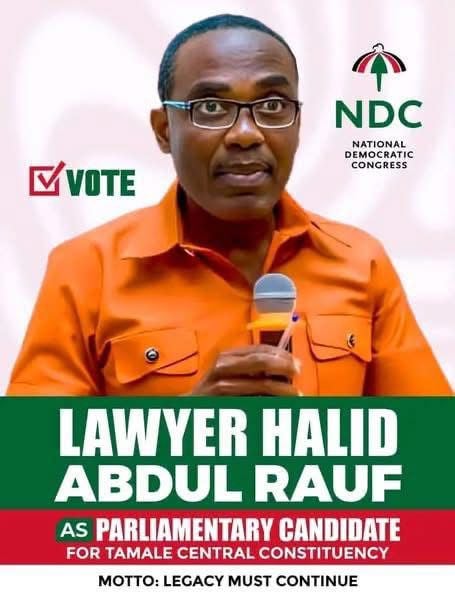The political landscape of Tamale Central constituency has experienced a significant shift with the unexpected withdrawal of Halid Abdul Rauf, National Vice Chairman of the National Democratic Congress (NDC), from the parliamentary by-election race. Just a day after formally expressing his intention to contest by picking up nomination forms, Rauf announced his decision to step aside, citing a confluence of personal, party-specific, and strategic considerations. This sudden move has reshaped the dynamics of the contest, narrowing the field of aspirants vying to succeed the late Dr. Ibrahim Mohammed Murtala, who tragically perished in a helicopter crash three weeks prior. Rauf’s withdrawal has undoubtedly injected a new element of unpredictability into the by-election, prompting speculation about its impact on the NDC’s prospects and the overall outcome of the race.
Rauf’s decision, announced through a public statement, was characterized by a tone of careful deliberation and respect. He emphasized the “deep reflection and extensive consultations” that preceded his withdrawal, highlighting the influence of his family, respected party elders, and the grassroots members of the NDC within the Tamale Central constituency. This consultative approach underscores the significance of the decision and the weight of the factors that ultimately led to his withdrawal. It also reflects the intricate web of relationships and loyalties that often shape political decision-making, particularly in contexts like Ghana, where personal connections and community ties play a crucial role.
The statement outlined three primary reasons for his decision. First, Rauf cited the profound personal bond between his family and that of the deceased MP, Dr. Murtala. This personal connection likely made the prospect of contesting the seat emotionally challenging, potentially creating a sense of internal conflict. Second, he acknowledged the unusually high number of aspirants who had entered the race, suggesting a potentially divisive and arduous internal party competition. With thirteen remaining contenders, the NDC faces the challenge of managing a complex internal selection process while maintaining party unity. Finally, Rauf emphasized the counsel he received from both party elders and family leaders, indicating the influence of these key figures in his decision-making process. This deference to established leadership reflects the importance of hierarchy and respect for experience within the NDC.
Rauf’s withdrawal has undoubtedly altered the dynamics of the by-election, removing a prominent figure from the contest and potentially shifting the balance of power among the remaining candidates. His statement, however, was carefully crafted to minimize any negative impact on the party’s unity and electoral prospects. He expressed sincere gratitude to the national and regional executives of the NDC, as well as his family and supporters, for their confidence in him. This expression of gratitude served to reinforce his continued commitment to the party and its goals, despite his personal decision to withdraw from the race. Furthermore, he explicitly called for unity within the party, emphasizing the importance of a cohesive front in honoring Dr. Murtala’s legacy and securing a decisive victory in the by-election.
The circumstances surrounding the by-election, stemming from the tragic helicopter crash that claimed the lives of Dr. Murtala and seven others, adds a layer of complexity and sensitivity to the political proceedings. The sudden vacancy has created a vacuum in the political landscape, leaving a constituency in mourning while simultaneously requiring a swift transition to choose a new representative. This delicate situation demands a sensitive and respectful approach from all involved, particularly the political parties and aspirants seeking to fill the vacant seat. Rauf’s withdrawal, framed within the context of respect for Dr. Murtala and a commitment to party unity, can be interpreted as an effort to navigate this sensitive environment with grace and responsibility.
The by-election in Tamale Central has now become a focal point of political activity, with the remaining thirteen aspirants vying for the NDC’s nomination and ultimately the parliamentary seat. The nomination process, with its closing date on Sunday, August 24, 2025, and filing scheduled for Thursday, August 28, will be closely scrutinized by political observers and the public alike. The NDC’s internal selection process will be crucial in determining the party’s candidate and their chances of success in the by-election. The party will need to manage the competition among the remaining aspirants effectively and ensure a fair and transparent process that reinforces party unity and strengthens their position going into the by-election. The outcome of this by-election will not only determine the political representation of Tamale Central but could also have broader implications for the national political landscape, particularly as it unfolds against the backdrop of the upcoming general elections.














